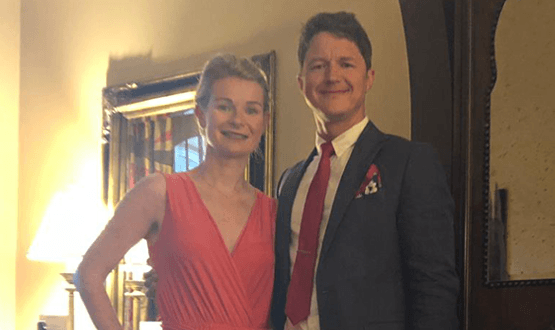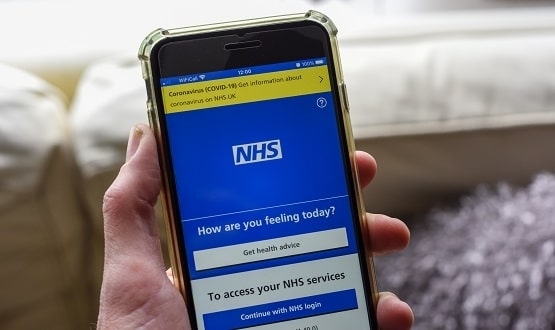Family heartbreak inspires career change for NHS Digital data director
- 19 November 2019

When Daniel Ray accepted the job of chief technology officer at Birmingham Women’s and Children’s Hospital, it was much more than a chance to improve care through innovation – it was about creating a legacy for his daughter, Scarlett.
Daniel and his wife Adele found out they were expecting a baby girl last year but, in a tragic turn of events, Scarlett died just days before her due date.
But from trauma and pain came an inspirational turn Daniel’s career path, leading him to accept a job he hopes will enable him to give back to the hospital that helped himself and Adele through such troubling times.
Daniel, who is currently director of data at NHS Digital, will leave his post to take up the role of chief technology officer at Birmingham Women’s and Children’s Hospital in the new year.
The role will also cover regional genetics programmes and child and adolescent mental health services at Birmingham and Solihull.
It’s a role 39-year-old Daniel sees as an opportunity to not only make a difference to the quality of care the hospital can provide for patients and improve clinicians day-to-day lives, but also to protect other families from the same heartbreak he and Adele suffered.
“It made me realise that I really wanted to give something back to the hospital and I feel really passionate about helping the hospital advance and giving something back to Scarlett by putting my skills and experience to good use – by helping the hospital use technology and use data to try to advance research and deliver even more advanced services than it does now, and trying to prevent what happened to me and Adele from happening to anyone else,” says Daniel.
“I want my role to make sure that the hospital delivers on its priorities. I very much view my role as being there to serve our doctors, our patients and our board to make sure we deliver what’s right.
“But part of me will want to do everything that I can to help mothers, babies and children in general, advancing anywhere I can so that this terrible tragedy to happen to me, personally, doesn’t happen to anybody else.
“Also, that we just deliver the best possible services for mothers, babies and children who are going through any kind of trauma.”
Scarlett was due on 5 April 2019, but died just days before.
On 27 March Adele, 36, had a scan and was told Scarlett was healthy and everything looked normal. Midwives told her they expected to see her in a few days to give birth.
The next day on 28 March, when Daniel came home from work, Adele said she was worried because she hadn’t felt as much movement from Scarlett.
“This is where the data and statistics really go against you. I was sitting there thinking 0.4%, or one in 260, chance… there were 780,000 live births last year and 3,000 died, even fewer at such a late stage,” Daniel says.
“I said ‘I’m sure everything is fine’. I was so confident that everything was alright.
“We went down to the hospital, we went into examination room and the midwife put the doppler on Adele and pressed the alarm button and said ‘I’m really sorry but Scarlett has died’.
“At that point no reason at all was identified as to the cause.”
Daniel and Adele then had to face the ordeal of giving birth to Scarlett, knowing she’d never take her first breath.
On 30 March Adele was induced at 10am and Scarlet was born at 9.04pm, weighing in at 6lbs 9oz.
“She was absolutely beautiful,” Daniel says.
He and Adele were given as much time as they needed to say goodbye to their baby girl.
Adele had lost a significant amount of blood and suffered acute kidney injury during the birth, which meant she was kept in hospital for five days.
During that time, Scarlett was laid in a room next door to theirs, so Daniel and Adele could visit her whenever they wanted.
“It was really traumatic and upsetting for us,” he says.
“She was in a room next door to the room we were in and sometimes she would be in with us when we felt strong, and then Adele or I would break down and fall apart and we’d move her into the room next to us again while we built up some strength.”
“It’s really important for me to say we received fantastic care at the hospital and we couldn’t rate the quality of care we got from the midwives and nursing staff any higher.”
After an extensive post-mortem, doctors could find no reason for Scarlett’s death other than her umbilical cord being wrapped around her neck. She was buried next to Daniel’s mum and he and Adele visit her regularly to talk to her.
Creating a legacy for Scarlett
Over several months of counselling, Daniel realised that he wanted to give back to the hospital that had helped him and Adele through such a difficult time.
He also realised he needed to be closer to his family to better support Adele – his NHS Digital role requires constant travelling across the country – so he decided he needed to find a job closer to home.
“I just felt, probably a couple of months after she died, that I really wanted to focus in much more so around doing something that was directly related as to why we lost her,” Daniel says.
“There were a number of other drivers, as well. It gets me back to my home city, it’s slightly more technology focused – I’ve been more focused on data so this enables me to branch out more into technology, it enables me to be closer to my family and it enables me to give something back.
“If Scarlett is watching, which I hope she is, she can see that I’m trying to help other people by putting the skills I’ve got to good use.”
In his extensive career in health informatics, which spans 21 years, Daniel was the first chair of the Digital Health CIO Network when it launched in 2012.
In his four-year stint at NHS Digital he has overseen several transformation programmes, including the strategic national data processing services platform which went live this year, upskilling the workforce and improving access to data technologies.
Speaking about his new role, Daniel says he will focus on important infrastructure and accessibility programmes to build “greater resilience of systems” as well as “jazzy exciting stuff” like wireless streaming.
There is a “big list” of innovative projects that the hospital wants to get on with, and that he’s looking forward to working with the team, he adds.
“What I want to do is make sure that there’s a view in the workforce that technology helps them and enables them and they take pleasure in using devices or networks in what they do,” he explains.
“Secondly, is to make sure we get some really brilliant, world-leading advancements in tech that help us advance quality, and the type of care and outcomes that the hospitals delivers.”
Since Scarlett’s death, Daniel and Adele have done as much as they can to honour her. Daniel wears a scarlet tie to work every day, Adele has raised £8,500 for charity and they both wear bracelets engraved with her name and date of birth.
Adele is now pregnant again and they’ve decided that if they have a girl, her middle name with be Scarlett.




